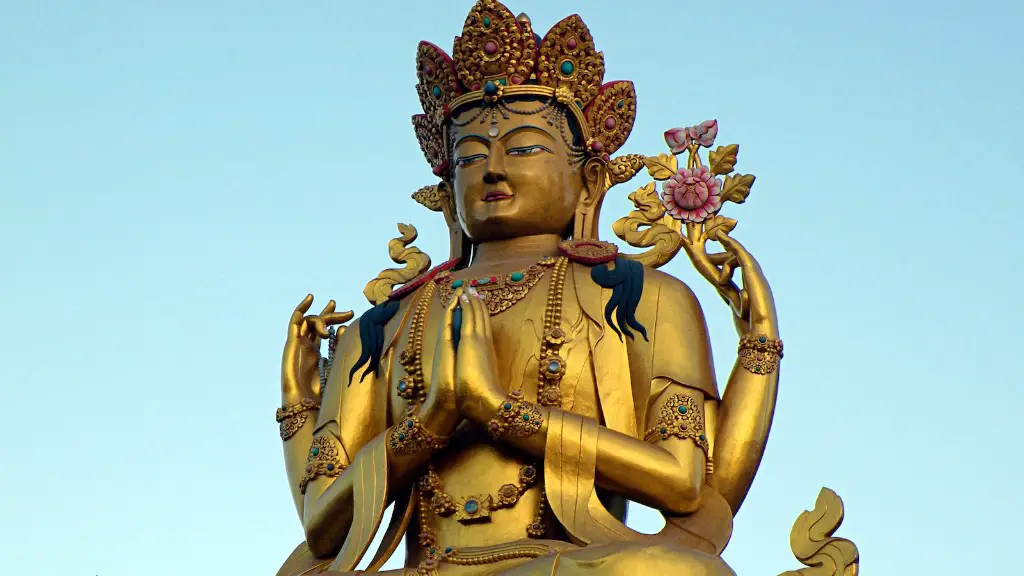Background Info
Hinduism is the oldest of all major world religions, and it is one of the most complex and diverse. Hinduism has been around for thousands of years, originating in the Indus Valley region in modern-day Pakistan and spreading its influence throughout India and eventually the world. It is a religion consisting of multiple gods, holy scriptures, and rituals. Its core belief is that each individual has an eternal soul, referred to as an atman, and the highest spiritual goal is to achieve moksha, or liberation from the cycle of reincarnation. Various spiritual paths are available to aid individuals in reaching this ultimate spiritual goal.
Relevance
Hinduism is very relevant in modern times as it provides a great amount of flexibility for believers, regardless of their background and beliefs. In Hinduism, there are no hard and fast rules that must be followed, and each person is free to choose which path works best for them to fulfill their spiritual goals. There is no one dogma or doctrine that must be adhered to, but multiple paths that can be taken. This makes Hinduism especially attractive to people from many different backgrounds, as it provides them with the freedom to choose a path that is appropriate for them. Hinduism also emphasizes tolerance and understanding for different beliefs and viewpoints, making it an inclusive and progressive religion.
Respect & Peace
In Hinduism, respect and peace are important principles that should be upheld. Respect for all living creatures is emphasized in Hindu scriptures, which encourages believers to bring peace and tranquility to their lives as well as to the lives of others. Hindus seek to create a harmonious environment with the community and nature, and they strive to maintain the balance between the two.
Dharma & Karma
Hinduism also puts an emphasis on the concepts of dharma and karma. Dharma is a set of moral principles, while karma is the concept that the actions taken in this life will determine the fate of the individual’s soul in the afterlife. By following dharma and listening to the teachings of the Vedic scriptures, a person can become closer to bliss.
Scriptures & Common Practices
Hinduism is a rich and diverse religion that is based on four of the most important ancient texts: the Vedas, Upanishads, Puranas and Mahabharata. These scriptures provide teachers and students alike with guidance on spiritual observance. Common practices include meditation, mantras, puja and regular offerings.
Identity & Comfort
Hinduism provides believers with a sense of identity and comfort as they are able to practice their beliefs in many ways. Many Hindu traditions have been passed down through generations, and because of this, it is seen as an important part of Indian culture. There is a long and proud history associated with Hinduism, and it is a source of pride for many Indians.
Festivals & Celebrations
Hinduism is home to a wealth of festivals and celebrations. These include major occasions such as Diwali, Holi and Pongal, as well as more localized events such as Onam, Janmashtami and Bihu. These are all annual festivals of lights, colours, music, food and dance that bring joy to Hindu believers and help to foster a feeling of togetherness.
Philanthropy & Kindness
Hindu believers are known to be very charitable and compassionate with their neighbors, performing acts of kindness frequently. Hinduism is a religion that teaches us to think of others, and encourages us to be active in doing good in our communities. This sense of philanthropy is seen in many philanthropic projects, hospitals, schools and other charitable institutions that are run by Hindus throughout India, and the world at large.
Ultimate Purpose
Hinduism’s ultimate purpose is to lead people to a state of spiritual freedom. To that end, Hinduism offers many paths and techniques for individuals to reach this state. Through meditation, yoga, mantras, Pujas, and offerings, individuals can become closer to becoming one with the divine. In addition, Hinduism teaches about ‘ahimsa’, which is the practice of non-violence, and encourages its believers to maintain a peaceful, harmonious environment. This combination of spirituality and peacefulness makes Hinduism attractive to many.
Life Cycle Ceremonies & Rituals
Hinduism has many life cycle ceremonies and rituals that are designed to bring good luck and prosperity to the individual and their family. From important occasions such as birth, marriage and death, to less formal ones like naming ceremonies, getting a haircut and exchange of gifts, Hindus have many rites of passage that bring together family members and offer a spiritual connection.
Yoga & Ayurveda
Hinduism is also a source of yoga and Ayurveda, which are two ancient healing arts that are seen as powerful tools to promote physical and mental wellbeing. Yoga is a form of exercise that helps to improve strength and flexibility, while Ayurveda is an ancient system of medicine that promotes a holistic approach to health and wellness.
Science & Spirituality
Hinduism is unique in that it has a strong connection between science and spirituality. The ancient Vedic scriptures contain many references to mathematics, astronomy, and other scientific principles, demonstrating the complex relationship between science and Hinduism. Believers are able to use science to explore the mysteries of the Universe and to connect with the divine.
Conclusion
Hinduism is an ancient religion that is still relevant and beneficial in today’s world. It provides believers with a set of values and beliefs that encourage respect, peace, philanthropy, and kindness. It is a religion that is full of rituals and ceremonies, and that encourages its followers to grow in their spiritual journey and reach a state of ultimate peace.

